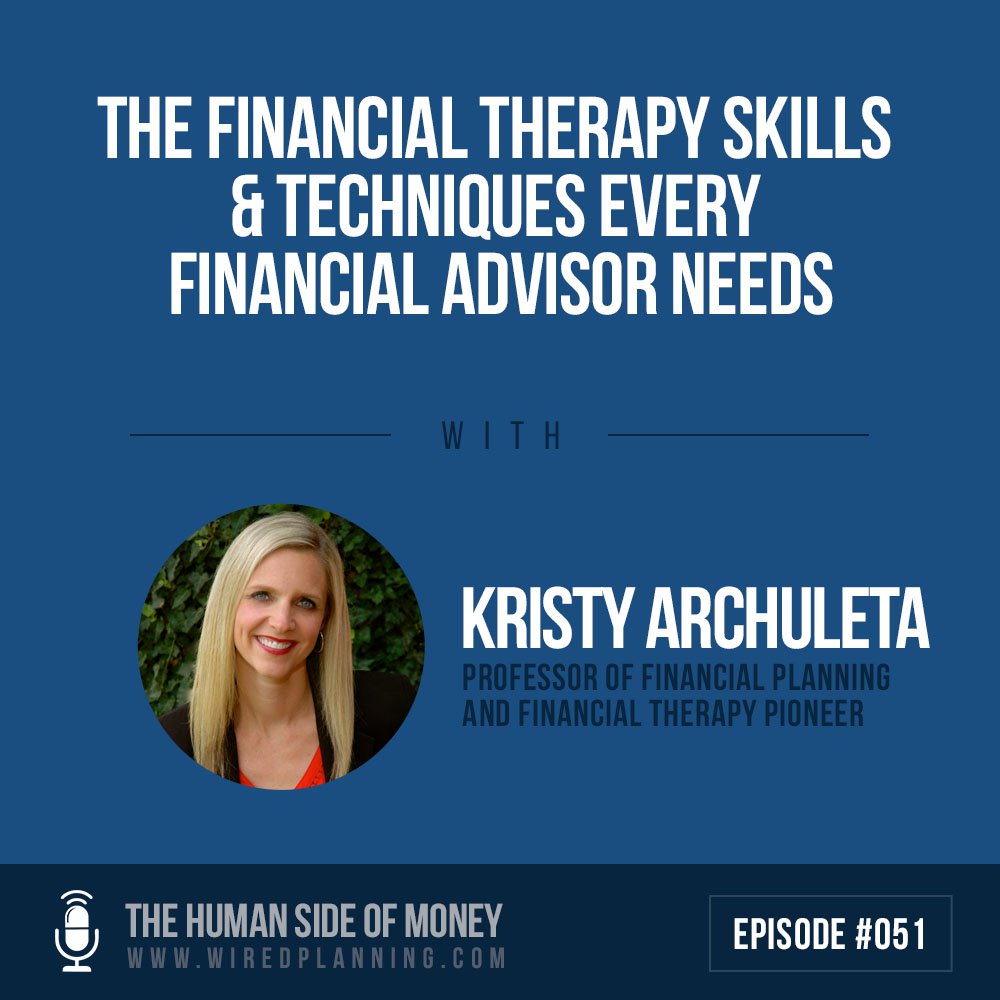Show Links
*If you want to be notified when the next episode packed full of practical tips and strategies to master the human side of money will be released, you can:
- Subscribe to the Show
- Join the community of like-minded advisors and planners across the world being notified via email. In addition to podcast releases, you’ll get our monthly “Wisdom Round Up” where we deliver to you the best content from around the industry on applying behavioral finance and mastering the human side of money.
Episode Summary
All the trainings, designations and certifications financial advisors receive fail to teach the difference between crunching numbers and being a financial advisor.
Between decisions made on a spreadsheet and decisions made at the kitchen table.
One is formulaic. The other is a social skill set rooted in connection, communication, psychology, etc.
Think about two parents at odds over the decision to fund their child’s college education.
On a spreadsheet, it’s a simple calculation based on time horizon, amount of money needed, investment allocation and account selection. Enter the numbers in the equation and press “Calculate.”
But everything changes when you shift the decision to the kitchen table.
The husband wants to retire early, because his dad’s inability to retire robbed him of precious time with their family.
Every dollar that flows into the college fund subtracts from the amount of time he gets with his family. A feeling that no spreadsheet can model.
Meanwhile, the wife wants to provide a fully-funded education for her children. And, of course she does. That’s exactly what her parents did for her.
Left to the spreadsheet, the child would have a fully funded education and an unfulfilled father.
Consider another common example from an advisor working with a couple in their mid-50’s struggling to implement her advice.
The couple came in with the intent to finally start planning for their long-awaited, much-anticipated retirement.
After gathering data and crunching numbers, the advisor advised them to save an extra $1,000/month in order to retire in within 10 years.
Once again, on a spreadsheet it’s a simple calculation involving current investments, time horizon, asset allocation, etc.
But, fast forward six months and the couple hadn’t saved $1.
Everything changed at the kitchen table when the couple realized that saving an extra $1,000/month would require cutting back on social gatherings with friends and vacation funds.
There’s a stark difference between crunching numbers and working with human beings on an emotionally-charged topic of money.
And doing so requires a completely different skill set. One that’s rooted in behavior, psychology, communication and connection.
One that instills trust as you guide clients through the process of unearthing their values and emotions around money, and ultimately, changing their behavior for the better.
Or, in other words, it requires mastering the human side of advice.
The skills and techniques to do that are at the core of financial therapy. And, fortunately, Dr. Kristy Archuleta is a pioneer in helping to apply financial therapy skills in the world of financial advice and financial planning.
Even if you don’t want to be a Certified Financial Therapist, the skills and techniques from financial therapy help to enhance client relationships, improve client behavior, and deliver better outcomes.
Things You’ll Learn
- The “No Advice” rule she teaches for every first meeting
- The invisible cues we aren’t aware of that influence conversations with both clients and prospects
- How your way of interacting is actually affecting how clients react (and vice versa!)
- The #1 thing you should do to positively affect a meeting that nobody actually does
- The most effective ways to address tension and anxiety coming from a client
- The correlation between the quality of your relationships with clients and the outcomes they achieve
- A tip that helps to actually feel comfortable embracing silence
- How asking questions improves implementation of advice (and what questions to ask)
- The three most influential factors in determining client outcomes (two of which the advisor can control)
About Kristy Archuleta, Ph.D., LMFT, CFT-I™
Dr. Kristy Archuleta is a Professor in the Financial Planning program at the University of Georgia, a licensed Marriage and Family therapist, and a Certified Financial Therapist-I™.
She researches, writes, and speaks on financial therapy, couples and money, and effective mechanisms to improve financial and overall well-being. And she has co-authored countless award-winning books and research papers on applying financial therapy in financial advice.
Other Episodes You’ll Like On Financial Therapy
- Episode 27: Enhancing Client Connection And Outcomes In Virtual Financial Planning Meetings w/ Dr. Sarah Asebedo
- Episode 26: Financial Therapy Skills 101 For Financial Advisors w/ Nate Astle
- Episode 38: A Framework For Understanding And Navigating The Dynamics Of Working With Couples w/ Ed Coambs
Resources
Whenever you’re ready, there are 3 ways I can help you master the human side of advice:
- HSOA Masterclass: An 8-week group program on building trust & connection, aligning money and life, and delivering frictionless advice.
- The Ultimate Discovery Meeting: A proven framework to seamlessly convert prospects into life-long clients in one meeting.
- HSOA Community (COMING SOON!): An online space to meet, collaborate, discuss, brainstorm, learn and grow with other advisors passionate about the human side of advice
If you’re interested, let me know here.





